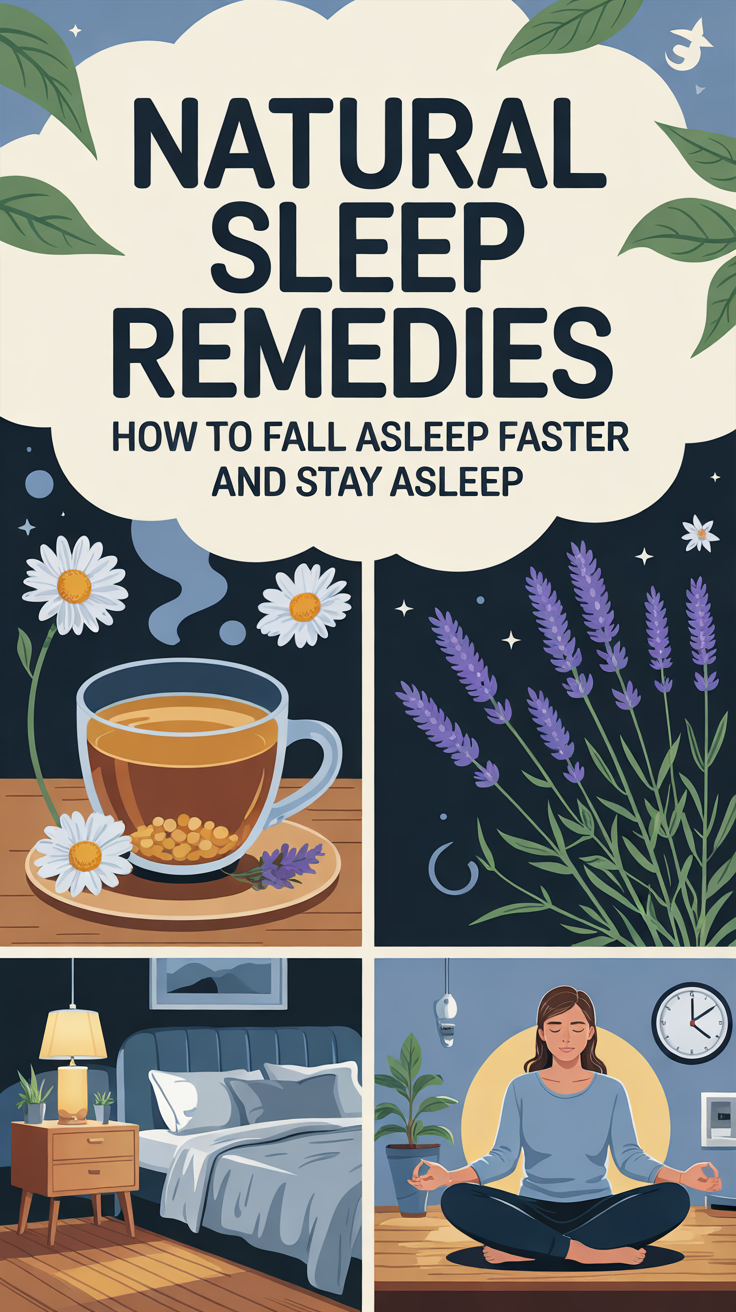Natural Sleep Remedies- How to Fall Asleep Faster and Stay Asleep
If you’ve ever tossed and turned at night, you know how frustrating it can be. Fortunately, there are natural remedies that can help you fall asleep faster and stay asleep longer. By making simple adjustments to your routine and incorporating specific techniques, you can create an environment conducive to restful sleep. Curious about what these remedies are and how they can transform your nights? Let’s explore the most effective strategies together.
Understanding Sleep Cycles
Understanding sleep cycles is essential for improving your overall sleep quality. When you grasp how your body transitions through different stages of sleep, you can better utilize natural sleep remedies. Each cycle lasts about 90 minutes, including light and deep sleep, as well as REM sleep. By recognizing when you naturally feel sleepy or restless, you can create a bedtime routine that aligns with these cycles. Incorporating magnesium-rich foods into your evening routine can further enhance your sleep-wake cycle and promote restful nights. Additionally, different sleep stages contribute to physical and mental restoration, making it crucial to understand their role in your sleep. Incorporate calming activities, like reading or gentle stretching, to signal your body it’s time to wind down. Embracing this knowledge helps you feel more in control, fostering a sense of belonging to a supportive sleep community.
Herbal Remedies for Better Sleep
Recognizing your sleep cycles can guide you in choosing effective herbal remedies for better sleep.
When you embrace these natural options, you can feel more at peace and connected to your body’s needs. Consider these soothing herbs:
-
Chamomile: Picture sipping a warm cup, its floral aroma wrapping you in comfort. This herb may enhance your body’s ability to promote relaxation and support better sleep.
-
Valerian root: Imagine a gentle lull, easing your mind into tranquility.
-
Lavender: Envision the calming scent, lulling you into a serene slumber.
Incorporating these herbs can support your body’s natural production of sleep-inducing compounds, promoting a restful night.
The Role of Aromatherapy
While you may already rely on herbal remedies to enhance your sleep, incorporating aromatherapy can elevate your nighttime routine even further.
Scents like lavender, chamomile, and cedarwood create a calming atmosphere, inviting relaxation and comfort. You might try diffusing essential oils or using scented candles to fill your space with these soothing aromas.
As you unwind, take a moment to breathe deeply and let the scents envelop you, helping to signal your body that it’s time to rest.
With aromatherapy, you can create a nurturing environment that not only supports your sleep but also strengthens your sense of belonging to this peaceful moment.
Relaxation Techniques to Calm the Mind
How can you quiet your racing thoughts and prepare your mind for a restful night? Embrace relaxation techniques that help you unwind and foster a sense of belonging.
Try these methods to calm your mind:
-
Deep Breathing: Inhale slowly, filling your lungs, then exhale gently, releasing tension.
-
Guided Imagery: Picture yourself in a serene landscape, like a tranquil beach or a peaceful forest.
-
Gentle Stretching: Loosen your muscles with simple stretches, allowing your body to release stress.
The Importance of Sleep Hygiene
Sleep hygiene plays a crucial role in ensuring you get the restorative rest your body needs. By creating a comfortable sleep environment, you signal to your mind and body that it’s time to wind down.
Establishing a consistent sleep schedule helps regulate your internal clock, making it easier to drift off and stay asleep. Limiting screen time before bed can reduce distractions and promote relaxation.
Dietary Changes to Promote Sleep
Making lifestyle adjustments can significantly enhance your sleep quality, and diet is a key factor to consider.
By choosing the right foods, you can create a cozy environment for restful nights. Here are a few dietary changes to help you drift off more easily:
- Warm milk or herbal tea before bed, soothing your body and mind.
- Complex carbohydrates like whole grains, which can boost serotonin levels.
- Magnesium-rich foods such as almonds or spinach, promoting relaxation.
Embracing these changes not only supports better sleep but fosters a deeper connection to your overall well-being.
You’re not alone on this journey!
Physical Activity and Sleep Quality
While it’s easy to overlook, incorporating physical activity into your daily routine can significantly boost your sleep quality.
Engaging in regular exercise helps reduce stress and anxiety, making it easier to unwind at night. Whether it’s a brisk walk, a dance class, or a workout at the gym, find an activity you enjoy.
Aim for at least 30 minutes most days, but listen to your body and adjust as needed. You’ll not only feel more connected to your community through shared activities, but you’ll also sleep better, waking up refreshed and ready to tackle the day ahead.
Your journey to restful sleep starts here!
Mindfulness and Meditation Practices
Mindfulness and meditation practices can be powerful tools for enhancing your sleep experience. By incorporating these techniques into your nightly routine, you can create a calming environment that fosters relaxation and connection.
Picture yourself:
- Breathing deeply, feeling each inhale and exhale release tension.
- Visualizing a serene landscape, evoking a sense of peace and belonging.
- Practicing gratitude, reflecting on the day’s moments that warmed your heart.
These simple practices ground you, anchoring your mind and body, making it easier to drift into restful sleep.
Embrace mindfulness, and you’ll find yourself wrapped in tranquility, ready to recharge for tomorrow.

